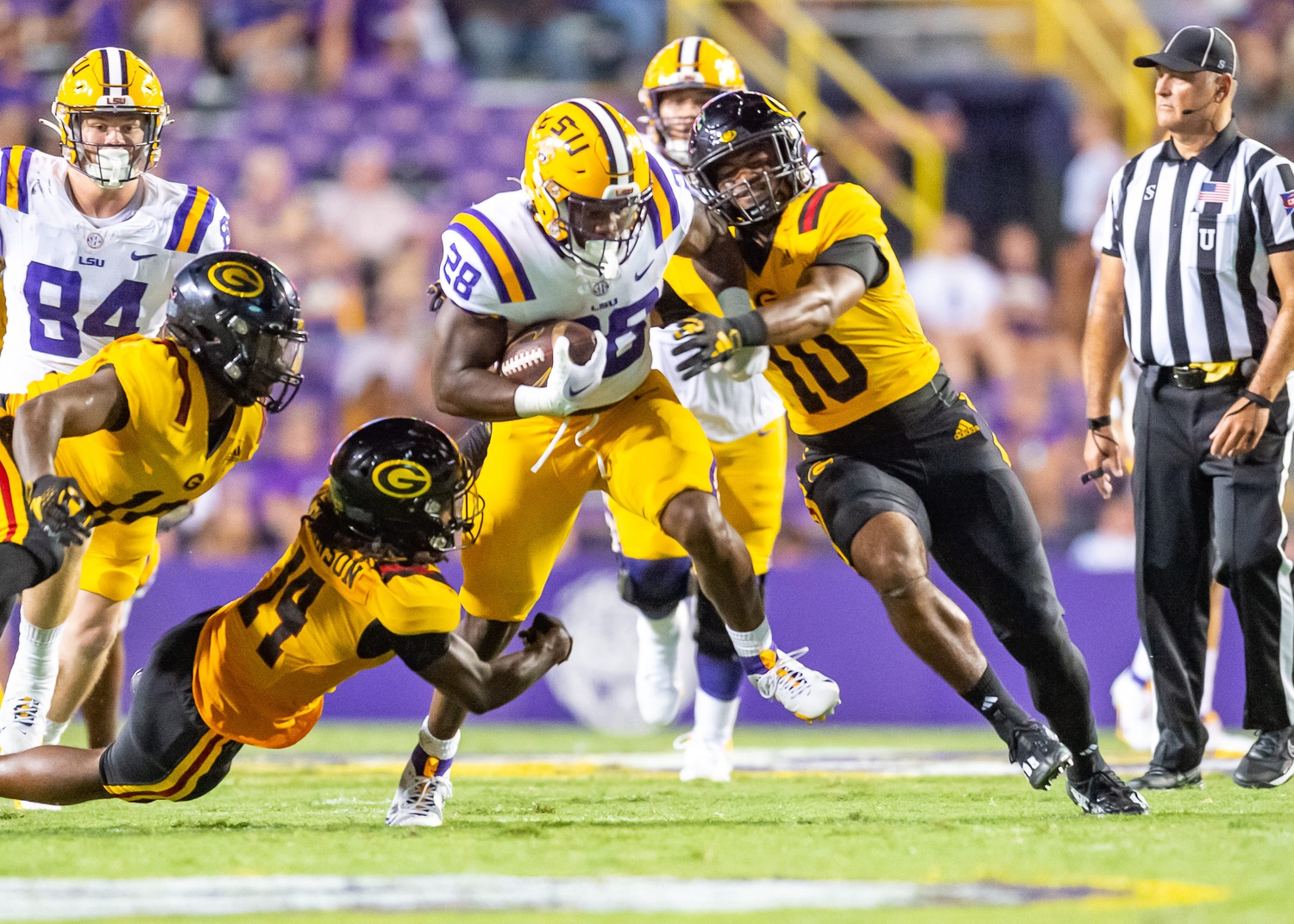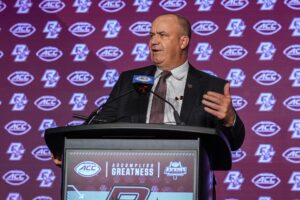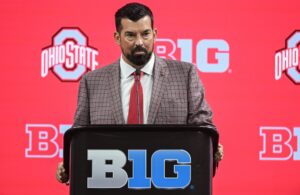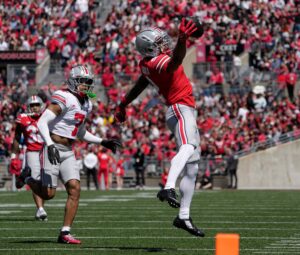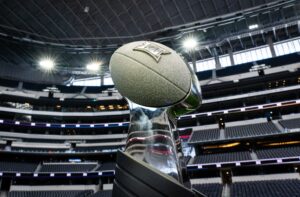LSU Pulls Away From Grambling
The LSU Tigers defeated in-state foe Grambling State 72-10 on Saturday. The scoring margin in the win would indicate that LSU corrected what went wrong against Florida State. Unfortunately for the Tigers, that was not quite the case.
Grambling routinely marched down the field in the first quarter, gaining first downs on the ground and through the air. The I-20 Tigers had chunk plays of 22, 34, and 36 yards in the first quarter.
To be fair, there were also positive takeaways from the game. Mike Denbrock’s offense should be commended for scoring touchdowns on 10 of 11 drives. Maason Smith’s return allowed him to reacclimate himself to live game speed in a game in which he would not have to be perfect. Chris Hilton capitalized on his opportunity to make plays. No punts were muffed, although the fact that it’s mentioned says a lot about the state of the return unit.
Frankly, this game did not answer much about the legitimacy of this LSU football team. We’ll look at different aspects of the game beyond the final score to determine what can really be learned from Saturday’s contest.
Changes on the Offensive Line
The offensive line did not appear to be the dominant force they were expected to be in Week One. Consequently, the staff turned to freshman right tackle Lance Heard for an injection of talent and competition up front.
As promised, the LSU coaching staff inserted Heard into the lineup with the first-team offense. Albeit against lesser competition. Heard looked the part. His size, strength, and understanding of his responsibilities (no missed assignments) earned more trust from Offensive Line coach Brad Davis. It now seems like fans could be seeing Heard as a starter sooner rather than later.
Regardless of the opponent, the offensive line looked better as a whole at both run and pass blocking. LSU allowed four sacks in Week One compared to only one sack against Grambling. The caliber of the opponent plays into those stats, but one must also consider the number of backup offensive linemen that garnered a considerable amount of playing time in the second half.
The LSU running backs averaged six-and-a-half yards per carry against Grambling after averaging just four yards per carry against Florida State. Of the 49 total yards from running backs in game one, 35 came on one carry from Josh Williams. The backs had more room to run in their second game and capitalized on it.
Backs Emerge From the Pack
Logan Diggs faired very well in his first game as a Tiger. The former Rummel Raider showed twitch, power, elusiveness, and vision. He flashed the ability to make defenders miss in confined spaces but was also hard to bring down. Diggs led the team in rushing with 115 yards with just under eight yards per carry. It’s safe to say he made a good case to become the leading back in a crowded room.
While it was easy to see why Diggs was highly regarded in the transfer portal, true freshman Kaleb Jackson was just as impressive. Jackson is more of a one-cut-back, but his acceleration after putting his foot into the ground is elite. Jackson is a powerful back who will force his way onto the field, barring fumbles or injury. Brian Kelly spoke on the impressive play of the two newcomers in his post-game press conference. “With both backs, there was physicality and yards after contact. Obviously, it was not an SEC opponent so we were able to control the line of scrimmage and do it with regularity. We were more diversified in our running game,” said Kelly regarding Diggs and Jackson.
Williams will continue to have a role with this team, and Noah Cain received the game ball for his unselfish attitude. Both should be commended and appreciated. Diggs and Jackson have two of the higher ceilings in the running back room.
Defensive Woes
The LSU defense struggled to get off the field early in the game. Grambling deserves credit for multiple run calls on third and long situations that caught LSU off balance. LSU deserves blame for such poor run fits and a lack of gap integrity. A good play call is one thing, but running backs running through holes the size of the Grambling bass drum is another.
Despite the insertion of Denver Harris into the starting lineup, the secondary continued to struggle. According to Kelly, Harris is learning to become a more well-rounded corner outside of his comfort zone of press-man coverage. Harris gave up a touchdown, which appeared to be a product of inexperience. He mirrored the wide receiver with his feet and remained in phase throughout the play but didn’t have the confidence to turn his head around while chest-to-chest with the receiver.
The lone touchdown given up was not ideal, but LSU has bigger problems. More times than not the cornerbacks line up over 10 yards off the ball before the snap, giving huge cushions to receivers. The efforts to avoid getting beat over the top make open-field tackling more difficult with so much space between defenders and receivers. LSU cannot afford to continue to miss tackles as the Tigers enter SEC play.
One has to wonder about the identity of the LSU defense. Early on, Grambling was able to run and pass with success. Harold Perkins inexplicably had one tackle on the night. This isn’t a shot at Perkins. He has to be put in a position to make plays. There were several plays throughout the game when the LSU linebackers were unnoticeable. At some point, the Tiger defense will have to hang its hat on something. Sometimes a team might overcompensate to stop the run and get burned on a pass, but at least they committed to stopping at least one aspect of the offense. The level of defensive play in this game brought more questions than answers.
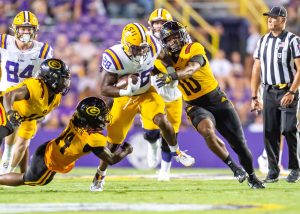
Photo courtesy: SCOTT CLAUSE/USA TODAY Network / USA TODAY NETWORK


